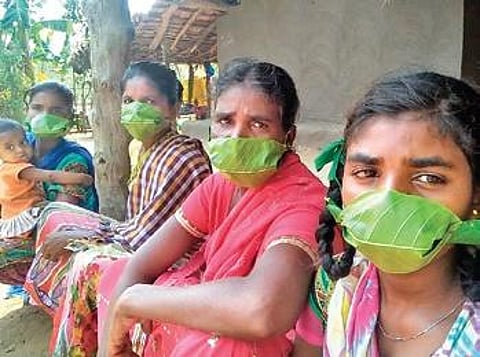

NEW DELHI: The Tribal Cooperative Marketing Development Federation of India (TRIFED) sent a proposal to the Ministry of Tribal Affairs on Monday to declare the van dhan centres as procurement centres for minor forest produces (MFP) gathered by forest-dependent communities in the absence of buyers amid the lockdown due to COVID-19 outbreak.
The van dhan centres were established for providing skill upgradation for tribal communities.
This comes amid fear looming on the severe financial impact of the lockdown among the tribal communities.
“We have sent a proposal that the van dhan centres be declared as procurement centres for minor forest produces. These centres will buy the produces and given them money. We have said in the proposal that there is distress. Since there is a lockdown, and this is the peak season for minor forest producers, we should take this initiative. Currently, there are 1,108 such centres,” said Pravir Krishna, MD, TRIFED.
The Centre and the state governments should take immediate steps to ensure tribal communities and other forest dwellers can sell their MFP at the minimum support price (MSP) or it will severely impact the livelihood options of tribal communities and other forest dwellers, said experts. A significant number of tribal communities depend on the MFP for their livelihood.
According to the MoTA, tribals derive 20-40 per cent of their annual income from MFP.
MFP items include wild honey, tamarind, sal leaves, sal seed, mahua seeds, neem seeds, karanj seeds, mahua flowers, tejpatta, and kukum (dry), among others which the communities gather and sell off. A number of items are seasonal and the selling off period for those products would be between March to June -- which the communities cannot afford to lose out on, pointed out Sanjay Basu Mullick from Jharkhand Jangal Bachao Andolan.
Odisha-based activist Y Giri Rao said while the Centre should instruct state governments to procure MFPs at the MSP rate, the state governments should ensure the payment is immediately made after procuring the items from the primary gatherers. “The income from the government has to proactively discuss with traders who deal with MFPs to come out with a set of suggestions,” he added.
The income from the minor forest produce also act as the economic backbone of women, Rao said.
“It is going to break the already fragile economy and will put at risk the basic survival of forest-dependent communities if immediate steps are not taken,” said Tushar Dash, an independent researcher and expert on forest rights issues.